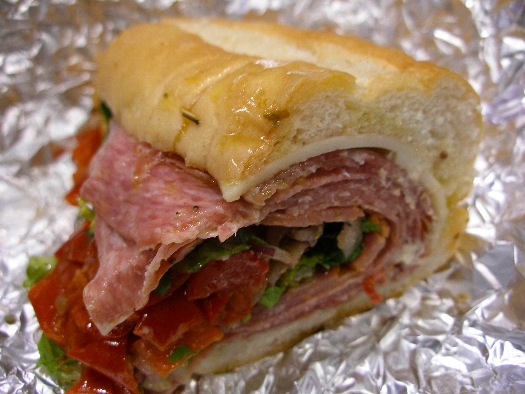Lessons from Luciano: On Food
 The best thing about working for Luciano was getting to use the meat slicer. Strictly speaking, Luciano's cafe was just a run-of-the-mill coffee joint in Montreal's Little Italy: underlit, overcaffeinated and subsidized by video lottery machines. "SANDWICHES, PASTA, PATISSERIES," read the window, though the only thing you could really order were the sandwiches. But my god, what sandwiches.
The best thing about working for Luciano was getting to use the meat slicer. Strictly speaking, Luciano's cafe was just a run-of-the-mill coffee joint in Montreal's Little Italy: underlit, overcaffeinated and subsidized by video lottery machines. "SANDWICHES, PASTA, PATISSERIES," read the window, though the only thing you could really order were the sandwiches. But my god, what sandwiches.
"Manger, c'est pas n'importe quoi," Luciano would say every time he prepared food, pursing his lips under his grey brush moustache as he guided an enormous log of deli meat towards the spinning blade. Brusque, round-bellied Luciano treated every sandwich like a wounded chick that needed coaxing back to health. Humming and muttering, holding the edge of the capocolli with just the very tips of his sausage-like fingers, he gently slid the slices of meat over one half of a Portuguese bun. He covered that with an equally-sized circle of provolone cheese, a forkful of marinated hot peppers plus another of oily marinated eggplant, a large leaf of lettuce and two rounds of tomato.
The order was important, but he refused to tell me how he wanted it to be done.
"Stand here beside me and watch what I do," he said.
If the sandwich was for a customer, he would neatly slice it in two and nestle it into a small plastic basket lined with paper towel. As he handed me the basket, he would lay a firm hand on my shoulder.
"Bring this over to them," he instructed in French, looking into my eyes over the tops of his glasses and gesturing to the seated customer with a toss of his bald head, "and say"—here he always affected what he imagined to be a pleasing feminine voice—"'Bon appetit, monsieur! Merci, monsieur!'"
Then he asked me to warn them not to spill oil on themselves.
When Luciano was not in, I spent most of my shifts reading and thinking about making myself a sandwich. When he was in, I spent most of my shift being told how to survive life as a human. Sitting me down across from him at his favourite windowside table, Luciano furrowed his brow, leaned back in his chair, and glared at the world outside before launching into one of his favourite topics (not trusting anybody, not trusting casino employees, inconsiderate people, etc). I would nod, making sounds of agreement between bites of my sandwich.
He once left the cafe for several hours, only to return with an elaborate meal prepared by his sister: an entire chicken in a foil-covered casserole dish, cooked carrots, potatoes, a salad. Luciano was fond of terrible Chinese delivery, which he would still eye with suspicion even while he crunched on an imperial roll and pronounced it "pas mal."
"Ferrets suck blood," he told me one quiet afternoon as he attacked a can of peas with a can opener. I raised my eyebrows.
"For food," he added. "They're savage."
No, Luciano, I said, laughing. That's not true.
"Non, c'est vrai!" he insisted. He dumped the peas into the sizzling pan on the stovetop and tapped in hot pepper flakes. "People take them hunting, like dogs, so they can follow rabbits down their holes."
He paused to retrieve a can of marinated tuna from under the counter, which he peeled open and spooned into the pan. He pointed to the jar of hot peppers in the glass-topped fridge and I handed it to him. He nodded to himself and hummed a little as he flicked several peppers into the mix.
"The only problem is they have to put a muzzle on the ferret," he continued, "because otherwise it would just sit at the bottom of the hole and grab the rabbit by its neck and drink its blood. It would never come back up."
I shook my head as I accepted a plate of food and brought it to the table.
"C'est vrai!" said Luciano, sitting down across from me. "Now - bon appetit."
(Read "Lessons from Luciano: On Money.")





